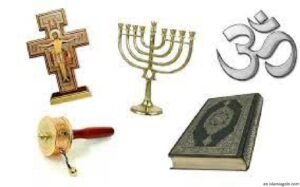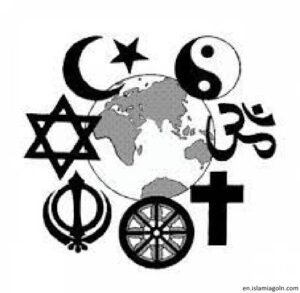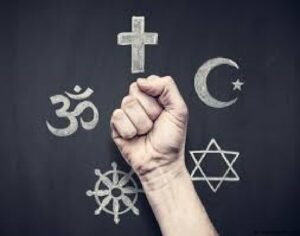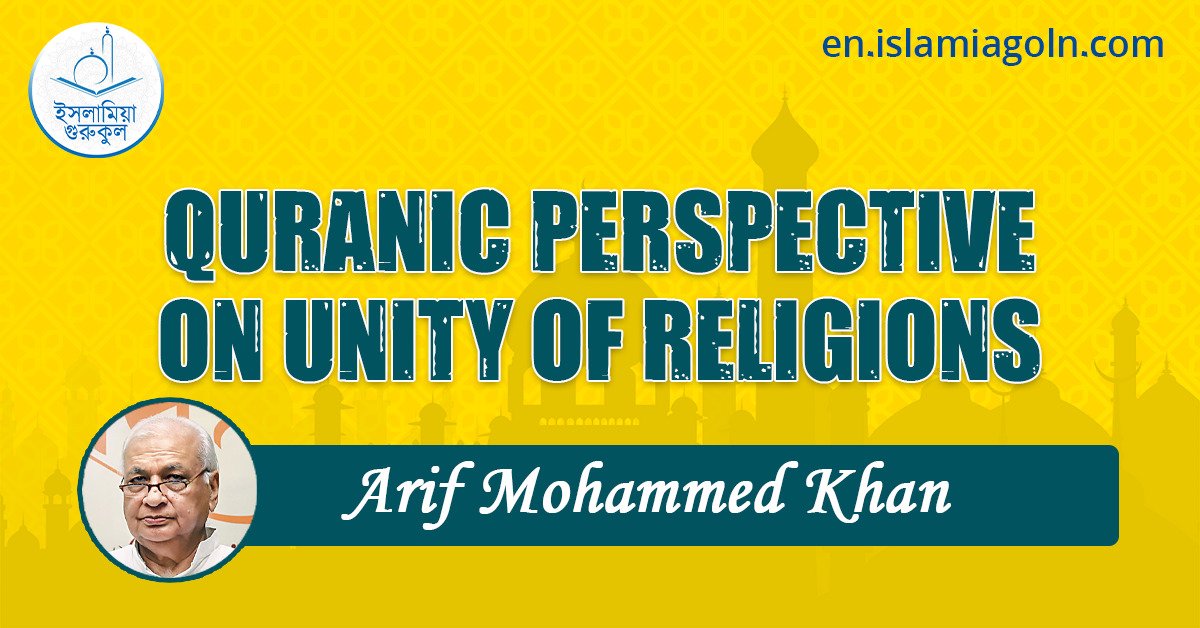Today’s Topic of Discussion: QURANIC PERSPECTIVE ON UNITY OF RELIGIONS

QURANIC PERSPECTIVE ON UNITY OF RELIGIONS
The Quranic verses on the unity of mankind are so numerous T that even a casual reader of the book will observe that though it acknowledges mankind divided into sects, communities and nations as reality but the clear underlying ambition is to restore to mankind its original sense of unity.
To begin with, Quran asserts that all mankind originates from one man and woman. The nations and tribes, they are born into, are merely a convenience of identity and honour depends exclusively on righteous actions. It says:
O mankind! We created you from a single (pair) of a male and a female, and made you into nations and tribes, that ye may know each other (not that ye may despise (each other). Verily, the most honoured of you in the sight of God is (he who is) the most righteous of you. And God has full knowledge and is well acquainted (with all things) (49.13)

The Arab society before the advent of Islam was an iniquitous society, where all status and honour was associated with birth and ancestry. The holy Prophet, on the occasion of the fall of Makka, declared emphatically: O People of Quraysh-Surely God has abolished from you all arrogance of ignorance and pride in ancestry All mankind have originated from Adam and Adam had originated from earth. An Arab has no superiority over non-Arab, nor does non-Arab have any superiority over Arab’.
The important thing is that Quran establishes not only common ancestry and status but declares with equal emphasis that no religious denomination enjoys any special status and in matters of reward all people are subject to the same standard and criterion. It says: “Those who believe (in the Quran) and those who follow the Jewish (Scriptures) and the Christians and the Sabians and any who believe in God and the last day and work righteousness shall have their reward with their Lord: on them shall be no fear nor shall they grieve’ (2.62).
The subject matter of the above verse is repeated in another verse (5.69), which reiterates the equality in matters of reward to the followers of different religions and denominations.

Elsewhere. Quran says that the adherents of one religion have no power to sit in judgement over those who pursue a different faith or mode of worship. The authority to judge is exclusive Divine prerogative and that all people shall be subjected to judgement only after the completion of their life terms. The Quran says: “Those who believe (in the Quran). those who follow the Jewish (scriptures), and the Sabians, Christians, Magians and Polytheists, God will judge between them on the Day of Judgement for God is witness of all things’ (22 17).
Further Quran clarifies that the recompense in the hereafter shall depend absolutely on the good and evil done in this world and not on any considerations of birth, family or protestations of faith: ‘Neither your desires nor those of the people of the Book (can prevail) whoever works evil will be requited accordingly’ (4 123).

In another interesting argument Quran censures all those who claim special status on account of their birth or denomination, that if they genuinely believed in their own claims that they alone and not others shall get into paradise, then why do they wish to stay in this world and desire not death: ‘Say, if the last Home with God be for you especially and not for anyone else then seek you death if you are sincere’ But they will never seek death on account of the (sins) which their hands have sent on before them’ (2.94-95)
Essentially, the Islamic concept of equality in matters of reward is rooted in the principle of ‘dignity of mankind’ assured to all human beings regardless of their creed, colour, community or gender. Abdulla Yusuf Ali in his commentary on these verses says that ‘the point is that Islam does not teach an exclusive doctrine and is not meant exclusively for one people’ and Maulana Azad describes it as Mushtarak Haq or Unity in Truth that pervades all the religions.
See more:
